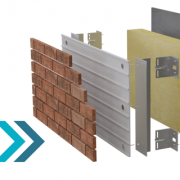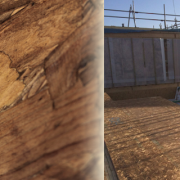Samuel Ryder was a very small secondary school with about 250 students. The Local Authority decided to extend the school’s provision to cover primary and secondary pupils. Since then the school, with an outstanding leadership Ofsted rating, has grown in popularity and demand for places has outstripped capacity.
Their timber frame modular building from TG Escapes was completed at the end of August 2020 ready for use in time for the students’ return to school. The block consists of 7 English classrooms, the English team office, an SLT office, year 7 and 8 toilets, a media suite and 2 year 6 classrooms. Whilst price was the key criteria during the selection process, the sustainable nature of the building materials used was a benefit.
“Offsite fabrication resulted in a very rapid onsite construction. I was impressed by the speed of delivery, which occurred on schedule, and the site manager who had excellent communication skills and was extremely accommodating of requests to tweak the original design.“ Ian Cushion, Scholars’ Education Trust Estates Manager.
Barker Associates consultancy sent out invitations to tender to six contractors, from which a shortlist of three was drawn up. The key criteria were price and quality, but it was also very important that the company selected had proven experience of working with schools, and that the individuals with whom the school had contact were of the right calibre.
The energy performance certificate for this building is A+ rated at minus 24 making the building carbon neutral, or net-zero, in operation.
Mechanical & Electrical systems are key to producing comfortable building environments as well as achieving energy efficiency and our M&E consultant Designphase Ltd used a combination of 4 systems to achieve this.
• Air source heat pumps to heat the hot water and most of the space heating.
• A hybrid active ventilation system to efficiently supply fresh air and extract stale air.
• LED lighting & lighting controls with daylight dimming to keep consumption to a minimum.
• A solar photovoltaic system was installed across the roof.
The air source heat pumps specified produce between 3-4 kilowatts of heat for every kilowatt of electricity used.
The ventilation system tempers the incoming air with the hot air being extracted using low wattage fans to distribute the air and provide a comfortable environment.
The LED lighting is inherently efficient and the addition of controls like daylight dimming means that when the spaces are flooded with natural daylight, the lights will respond automatically.
Finally, a large 72kW solar photovoltaic array was installed across the roof to help offset the energy used in the building.
The combination of these systems resulted in a building that is both comfortable to use and provides a high level of energy efficiency that will benefit the end-users at Samuel Ryder and the environment we pass onto the next generation.
TG Escapes partners in achieving this are Metropolis Architects, Solar for Schools, Passivent, Westcott Air Conditioning and Dextra.
“Energy efficiency was considered very important given the passion of many pupils for environmental issues. Rightly so – it’s this world that they are going to inherit. The students and staff find their time in the building wonderful. The primary occupant was the English department who feel very spoilt and lucky to have the experience of teaching and learning in their new classrooms. It was a very good experience from start to finish with TG Escapes, I would recommend them to others.” Ian Bailey, Deputy Headteacher.


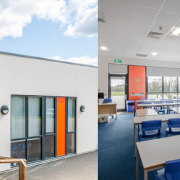

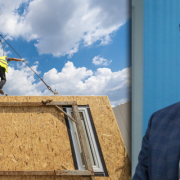
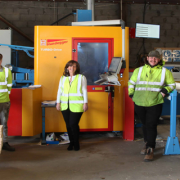
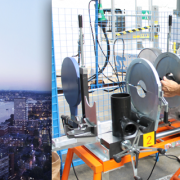
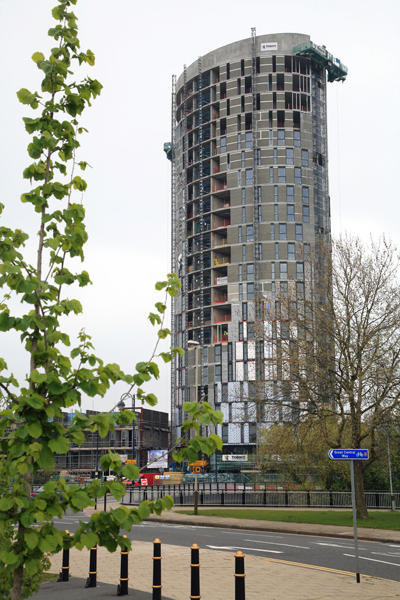
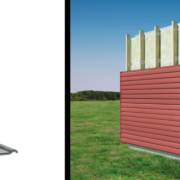


 During the R&D phase Modularwise realised that offsite and modular roofing requirements are extremely different to standard-build roofing mainly because of unit transportation to sites. Most standard roofing materials are quite heavy and brittle, and therefore do not travel well, especially when lifting into place and joining to other structures. After researching and trialling quite a few roofing choices, Modularwise finalised on TapcoSlate Classic as the roof covering for the entirety of the project due to its lightweight but highly impact-resistant properties… it also helps that it looks just like real slate and so more aesthetically pleasing than some other products they compared.
During the R&D phase Modularwise realised that offsite and modular roofing requirements are extremely different to standard-build roofing mainly because of unit transportation to sites. Most standard roofing materials are quite heavy and brittle, and therefore do not travel well, especially when lifting into place and joining to other structures. After researching and trialling quite a few roofing choices, Modularwise finalised on TapcoSlate Classic as the roof covering for the entirety of the project due to its lightweight but highly impact-resistant properties… it also helps that it looks just like real slate and so more aesthetically pleasing than some other products they compared.